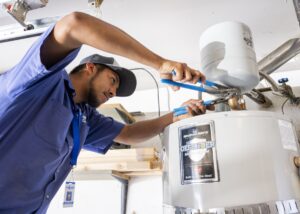The Truth About Water Heater Expansion Tanks
The warm, comforting shower after a long day is nothing short of a luxury—until you realize that almost 20% of your home’s energy usage goes towards heating water. It’s a domestic investment that we can’t skimp on. When it comes to water heater health, prevention is certainly better than cure. You may ask yourself do I need an expansion tank? Perhaps not today or even tomorrow, but sooner or later, you might face the inevitable choice.
The Pivotal Role of Expansion Tanks
Imagine your water heater system as the heart of your home, circulating heated water to every faucet and showerhead. Now, like every heart, it experiences fluctuations—specifically, in the water pressure. When water is heated it expands. A regular water heater system can manage these periodic jumps in pressure, but mishaps occur when those spikes become consistent and could lead to leaks, damaged valves, or ruptured water lines.
An expansion tank attached to your water heating system acts as a stabilizer. It absorbs excess water and pressure, preventing the kind of stress on the system that could bring it to a hot, scalding halt. It’s not a question of if, but a matter of when these spikes will demand additional support. Making the expansion tank a strategic long-term investment for your home.
When is the Right Time to Consider Installation?
Determining the necessity of an expansion tank isn’t a one-size-fits-all decision. The amount of hot water you can get depends on a few factors. These include the water pressure, the capacity of your water heater, and the elevation of your house. If your water heater is a closed system, meaning it’s connected to a backflow prevention device or pressure-reducing valve, an expansion tank is critical.
Another common scenario is if you witness consistent pressure relief valve discharges. This stream of hot water down your home’s drain is a clear indication of excess pressure within the system. It’s during such instances that you should reach out to a professional to evaluate and possibly recommend an expansion tank installation.
Signs You Might Need An Expansion Tank
The need for an expansion tank varies depending on your water pressure, the type of water heater you have, and local plumbing codes. However, some common indicators could suggest it’s time to install or replace an expansion tank:
- Temperature and Pressure Relief Valve Discharge: If water is regularly found leaking from the T&P relief valve on your water heater, high system pressure could be the issue.
- Sudden Bang or Hammer Noise in Pipes: A water hammer is the loud, repeating banging sound that can occur in your pipes when a valve is suddenly shut off. This can be caused by a check valve or pressure regulator that’s now required in many plumbing codes, which an expansion tank can alleviate.
- Fluctuating Water Pressure: Excessive pressure can lead to your home’s water pressure fluctuating, which can be irritating and may also damage your appliances and plumbing fixtures over time.
DIY or Professional Installation?
The decision to install an expansion tank by yourself or call in a pro should not be taken lightly. While there are countless online tutorials and DIY kits available, the risks associated can spell disaster for your property.
Professional plumbers with the right tools and knowledge can install an expansion tank tailored to your system’s needs. Remember, it’s not about the cost upfront, but the potential cost of repairs to your water heating system and home down the line.
How an Expansion Tank Becomes a Wise Investment
Investing in an expansion tank is not only a safeguard for your water heater; it’s an investment in your home value. Think of it as a reliability upgrade for your water system, similar to adding a security system to your home.
Apart from peace of mind, a properly installed expansion tank extends the lifespan of your water heater. The cost of an expansion tank pales in comparison to the damages it can prevent.
The Fine Balance of Pressure
The need for an expansion tank is all about balance—finding the equilibrium in your water heater system’s pressure. It’s a fine science that homeowners often overlook amidst the myriad of home maintenance tasks. Yet, understanding and monitoring this balance could not only prevent catastrophic damage but also optimize your water heater’s performance.
Conclusion
The world of water heater mechanics, while meeting the comforts of our daily routines, presents a slew of challenges. Handling pressure changes and hot water expansion can be tricky. Adding an expansion tank helps protect your water heater system. While it might seem daunting to consider every bit of machinery that supports our daily life. Ignoring the expansion tank could be a costly oversight.

